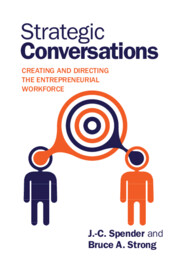Book contents
- Frontmatter
- Contents
- List of figures
- List of tables
- Acknowledgements
- Preface
- 1 Introduction – what are strategic conversations?
- 2 The strategic conversations imperative
- 3 Strategic conversations in the wild
- 4 Engaging employees in management’s agenda
- 5 Strategizing and the leaders’ role
- 6 Putting strategic conversations into practice – innovation communities
- 7 Conversation trumps structure – new norms for dialog
- 8 Strategic conversations across geographies, generations, and the multitude
- 9 Engaging the world outside in the conversation
- 10 Creating a self-reinforcing innovation platform – collateral benefits
- 11 Measuring the future
- 12 Epilogue – on managing
- Further reading
- Notes
- Index
12 - Epilogue – on managing
Published online by Cambridge University Press: 05 June 2014
- Frontmatter
- Contents
- List of figures
- List of tables
- Acknowledgements
- Preface
- 1 Introduction – what are strategic conversations?
- 2 The strategic conversations imperative
- 3 Strategic conversations in the wild
- 4 Engaging employees in management’s agenda
- 5 Strategizing and the leaders’ role
- 6 Putting strategic conversations into practice – innovation communities
- 7 Conversation trumps structure – new norms for dialog
- 8 Strategic conversations across geographies, generations, and the multitude
- 9 Engaging the world outside in the conversation
- 10 Creating a self-reinforcing innovation platform – collateral benefits
- 11 Measuring the future
- 12 Epilogue – on managing
- Further reading
- Notes
- Index
Summary
On its surface our book outlines a novel management tool – the design and implementation of strategic conversations – a tool relevant to complex organizations competing in dynamic global markets roiled by rapid technological change. But the reader has seen it is also about something subtler and deeper – the managerial role, how modern managers might best think about their work, responsibilities, and relationships.
To get at this we presented managing as a profoundly creative activity, perhaps our society’s most crucial, for without the economic value managers help create there would be no funds, nor time nor place for the arts or social improvements such as health care or education. Managers deal with people, their dreams and fears, their efforts to learn and desires to participate, not simply with investors’ funds and the market’s demands for goods and services. They make work happen, and work is where many people find a significant part of their identity and place in the world.
Thus, from our book’s start, we presented strategizing as a uniquely human activity, fired by our imagination and informed by our social and personal values. Managing people is not managing transactions. Properly done, both the manager and the managed are transformed and shaped to help achieve the organization’s goals. And as people are systematically changed, the strategy process becomes inescapably ethically burdened.
- Type
- Chapter
- Information
- Strategic ConversationsCreating and Directing the Entrepreneurial Workforce, pp. 209 - 210Publisher: Cambridge University PressPrint publication year: 2014



